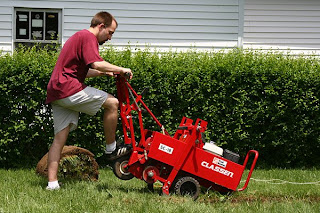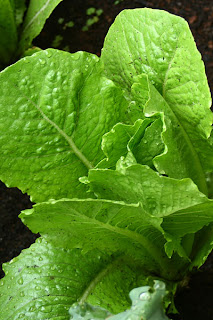At the beginning of last school year, I wrote out a wonderful plan of all of the units and activities I would do with the kids that year. In reality, we did more informal units, based around their interests and activities, while focusing on reading, writing, and math. One of the last units I had planned for the year was "plants and seeds," and I felt disappointed that we never studied it. Then, a few weeks ago, I realized that we have completed nearly the entire unit in the course of our summer gardening adventures. And, the kids likely learned more from their hands-on experience than they would have learned from formal instruction.
Our project began with the construction of a 4'x8' raised bed garden in our backyard.
 Josh used a rented sod-cutter to remove the grass, while bug-loving Hannah rescued earthworms and white grubs from the dirt below.
Josh used a rented sod-cutter to remove the grass, while bug-loving Hannah rescued earthworms and white grubs from the dirt below. Then, we measured, cut, and assembled the boards, and Josh gave each child, including Becca, a turn to help him drill holes for the screws.
Then, we measured, cut, and assembled the boards, and Josh gave each child, including Becca, a turn to help him drill holes for the screws.
 Finally, we filled the box with topsoil, compost, and peat moss, and planted vegetable transplants and seeds.
Finally, we filled the box with topsoil, compost, and peat moss, and planted vegetable transplants and seeds. Because the sod-cutter was so easy to use, we decided to create a second 4'x12' garden next to the garage.
Because the sod-cutter was so easy to use, we decided to create a second 4'x12' garden next to the garage. We planted a lot of veggies throughout the summer: slicing tomatoes, cherry tomatoes, green/red bell peppers, sweet orange peppers, cucumbers, pole beans, purple and yellow onions, red and orange carrots, turnips, broccoli, romaine, zucchini, summer squash, butternut squash, and pumpkins. The kids have helped me plant and harvest and weed and have seen tiny seedlings develop into large and bushy plants, covered in ripening vegetables.
We planted a lot of veggies throughout the summer: slicing tomatoes, cherry tomatoes, green/red bell peppers, sweet orange peppers, cucumbers, pole beans, purple and yellow onions, red and orange carrots, turnips, broccoli, romaine, zucchini, summer squash, butternut squash, and pumpkins. The kids have helped me plant and harvest and weed and have seen tiny seedlings develop into large and bushy plants, covered in ripening vegetables.

 Romaine:
Romaine: Tomatoes:
Tomatoes: Pepper:
Pepper: Onions:
Onions: Cucumber:
Cucumber: Broccoli:
Broccoli: Pole Beans:
Pole Beans: In addition to this experiential education, the kids and I have read several books to complement what they are learning. One of their favorite books, Muncha Muncha Muncha, has taken on new meaning to them, in light of them having their own garden. They have become much more sympathetic to poor Mr. McGreely, who keeps losing his vegetables, and they dislike the "bad bunnies" who keep stealing them. They also love the book The Carrot Seed, in which a little boy plants a carrot seed and cares for it, even though everyone tells him that the seed won't come up. In the end, of course, a huge carrot comes up and proves everyone else wrong.
In addition to this experiential education, the kids and I have read several books to complement what they are learning. One of their favorite books, Muncha Muncha Muncha, has taken on new meaning to them, in light of them having their own garden. They have become much more sympathetic to poor Mr. McGreely, who keeps losing his vegetables, and they dislike the "bad bunnies" who keep stealing them. They also love the book The Carrot Seed, in which a little boy plants a carrot seed and cares for it, even though everyone tells him that the seed won't come up. In the end, of course, a huge carrot comes up and proves everyone else wrong.Finally, our Bible times have reflected our gardening theme as well. The kids' new knowledge of gardening helped them understand two parables on a deeper level then they have in the past - the parable of the sower and the parable of the weeds. Isn't it amazing how Jesus uses common experiences and objects to explain his Kingdom, so ordinary people, even children, can begin to comprehend the mysteries of faith and eternity?
I do not think I could have planned a better unit on seeds and plants! I may pull out a few of the worksheets I have from a science book I purchased, but overall, I am amazed at what my children have learned this summer simply by being included in my gardening project. I think this is further proof that "Learning is Life."
No comments:
Post a Comment